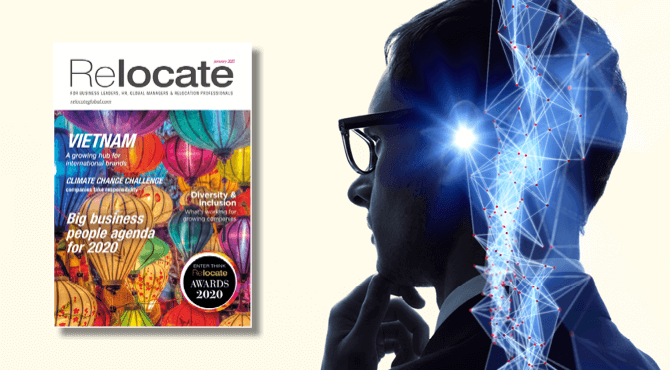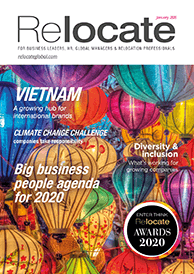What it means to be skilled and human
Reinvention and lifelong learning were just a few of the takeaway themes at the World Innovation Summit for Education (WISE) 2019 in Doha, Qatar.

Click on the cover to access the digital edition and order your printed copy.
This year’s WISE event saw international leaders from a cross-section of industries gather to effectively tackle the skills gap. With the ongoing transformation in tech and labour markets pushing policymakers, educators and employers to adopt quick fixes for reskilling the workforce, the question was how to drive the search for new tools and skills, rather than deferring to an agenda of advanced technology alone.Will the focus on workplace skills come at the expense of values? What systemic solutions, such as the digitisation of content or improved accreditation and assessment are needed to solve the skills gap? These were all themes debated by a mixed panel of professionals and educators in a session entitled: ‘Finding the Way Ahead’.
Lifelong learning
“We cannot just periodically specify a gap and then reskill for it – it’s an ongoing thing,” said Sheikha Hanadi Al-Thani, founder and CEO of AL Waab City Real Estate development project and CEO of Nasser Bin Khaled Al Thani & Sons Group. “The term ‘skills gap’ will not go away. It’s a continuous issue we have to work on. We are firefighting – there will always be a gap. The question is whether we have a dynamic system? Should education be a sole entity or multiple entities that involve various stakeholders? If I had to specify a skill gap now it would be financial literacy, but the remedy for that is an ever-evolving thing.”A vital message from the panel was the importance of lifelong learning, particularly in the workplace. “Education today is not a place. It is a lifelong experience not a bricks and mortar institution – that model doesn’t work anymore. We talk constantly about jobs that won’t exist anymore but we still churn out talent for those same jobs. Education has to be about adaptability, critical skills and interacting. There isn’t one model that fits all.”“Qatar is fortunate in some respects because we’ve started amending the education system. However, the rest of the region could be in a problem. We’re getting to the stage that if we have 100 million youths entering the same system, we will have 100 million unemployed,” added Ms Hanadi Al-Thani.Are we AI-ready?
Another topic discussed with urgency was the integration of AI. “There are not enough courses on AI. We need way more on machine learning, AI and ethics,” said Rose Luckin, professor UCL Knowledge Lab – UCL Institute of Education. “We need to understand ethics and the use of AI and that it can be used for good and bad. As well as what data can be collected and what can’t. There is no such thing as raw data – someone has made an ethical decision to collect that data.”“The only way to truly master AI Is through a co-designed multi-stakeholder approach,” noted Professor Luckin. However, she reinstated that “if we get this right” the possibilities of AI are plentiful and far-reaching. Referencing her advisory work for The Topal Review – a significant report on the digital future of the NHS workforce – she shared her findings for one of the largest employers in the world. Stating the importance of creating a learning culture that is not purely or primarily technology-driven. “I see many instances where companies are being driven by the technology, with pieces of AI being brought in by businesses and just falling over.”Read more about Technology and AI
While Ms Hanadi Al-Thani chimed that technology is reliant on the value system and the objective of the user and it should be a discussion among multi-stakeholders – both private and public.During a separate talk, Max Tegmark of the Future of Life Institute and author of Being Human in the Age of AI gave some concrete examples of how AI has been successfully applied and warned of its misuse. “AI can solve problems, but it can cause them too.” Mr Tegmark cited the benefits for medical research and training health professionals, while there were important lessons to learn in its use for the aviation and defence industry. “Should we be excited or worried about AI? The answer is both – that’s the nature of empowerment,” he added.
Skills versus knowledge
Another hot issue was the difference between skills and knowledge. “The UK, for example, has fallen into a trap about skills and knowledge, they are not two different things,” said Professor Luckin. “I like to think in terms of human intelligence and building that repertoire of intelligence. We need interdisciplinary academic understanding. We need social intelligence and we need a different relationship to knowledge. It should be about constructing knowledge, understanding things for yourself and understanding yourself in space and context.”“We also need to think about the reason for an education system. There are changes around the edge but education is still stuck particularly around credentialing,” said Professor Luckin. “There are problems with how we define human intelligence and IQ tests are a good example of that – we haven’t changed this system for decades,” she added.In a bid to rediscover the purpose of learning, a series of seminars gave audiences a chance to hear which skills are valued from a business perspective. The Champions of Skills forum shared how business leaders are developing and extending their core skills to sustain growth and thrive in their roles.Reinvent and repurpose
Co-founder and executive director of Groundswell Social Ventures, Gilad Babchuk, offered some refreshing insights. “Your future is defined by will – not skill,” he said. “Your will is your value, passion, strength and unique perspective.” Mr Babchuk went on to describe the value of adaptability and entrepreneurial skills in the workplace. “We should be repurposing ourselves every few years and constantly trying to reinvent ourselves to live more productive and meaningful lives,” he said.Speaking about his work in his hometown of Vancouver, Canada, Mr Babchuk noted the importance of “liberating people to define success for themselves – at the moment that’s typically defined by someone else. In Canada, by 2022, 45% of the country is likely to be self-employed.”David Osher, vice president of the American Institute for Research, discussed the importance of character skills. “It’s relationships that drive change and learning. If you want people to succeed you have to teach them to connect and interact. Don’t presume to know everything and when you’re talking to people, use and understand their local context.”Read more on WISE 2019
Jeremy Lamri, head of innovation and research at career guidance platform JobTeaser, challenged some views on intelligence and discussed the correlation, or lack of, when it comes to intelligence and performance. “The 21st-century view of intelligence is logical and mathematical, but this type of thinking is only relevant to about 40% of the population, yet we often reference it. Historically, it is those who can use words to be interpersonal and communicative that survive.”
Lessons from business
Filled to the brim, the Entrepreneurial Journeys session saw business thinkers reveal personal lessons of grappling with disruption in their industries. Emphasising the ability to manage change and anticipate new market trajectories to seize and create value was Patrick Brothers of data company HolonIQ. “AI will not solve a lack of creativity. AI can help you with facts, but it won’t create the spark because it’s people who make interesting decisions – not machines.”While HTC China president, Alvin Wang Graylin, spoke about the impact of VR in classrooms across China to how various companies are using VR in employee global training programmes, such as Volkswagen. He also illustrated how VR is being deployed to improve language learning to driving test pass rates. By and large, the mantra from business was that humans will prevail, providing they adapt. “Reinventing the self is essential for the future of work. That ability to deal with challenges and preserve our mental balance in unfamiliar situations. It’s not about reinventing products – it’s about reinventing ourselves,” concluded Sheryl Foo, APAC & MEA director at Vertech Capital.Read more articles in the Winter Issue of Relocate Magazine.
Subscribe to Relocate Extra, our monthly newsletter, to get all the latest international assignments and global mobility news.Relocate’s new Global Mobility Toolkit provides free information, practical advice and support for HR, global mobility managers and global teams operating overseas. Access hundreds of global services and suppliers in our Online Directory
Access hundreds of global services and suppliers in our Online Directory
©2025 Re:locate magazine, published by Profile Locations, Spray Hill, Hastings Road, Lamberhurst, Kent TN3 8JB. All rights reserved. This publication (or any part thereof) may not be reproduced in any form without the prior written permission of Profile Locations. Profile Locations accepts no liability for the accuracy of the contents or any opinions expressed herein.







































